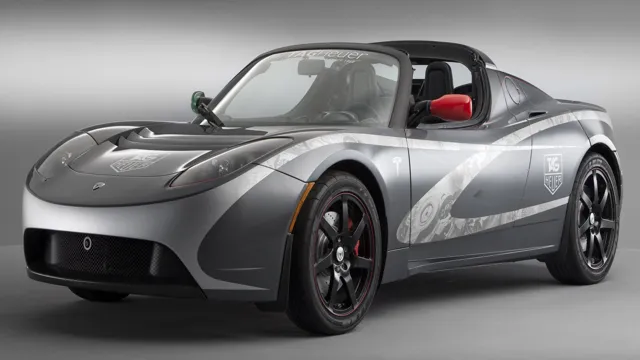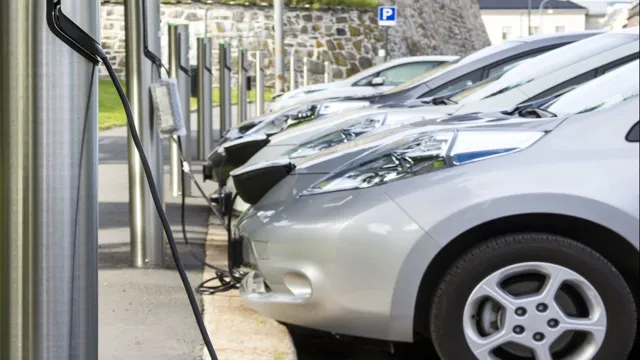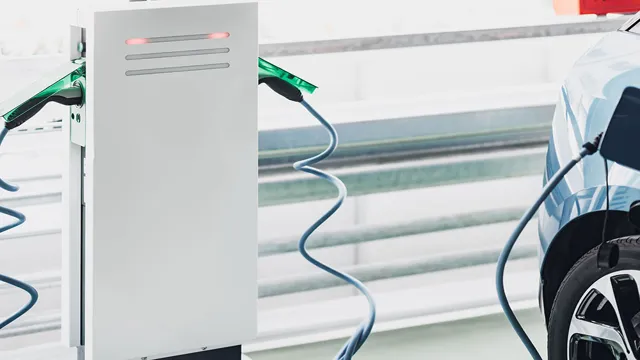Electric Cars: A Smart Investment for Your Wallet and the Environment
Electric cars have been gaining popularity over the years mainly due to their environmental friendliness and cost-effectiveness. Electric cars present a new way to reduce our carbon footprint and save money on gas expenses compared to traditional gas-powered vehicles. From startups to major automakers, the interest in producing electric cars continues to grow, and as the world transitions to cleaner energy sources, the benefits of electric cars cannot be ignored.
However, as with any significant purchase, buyers are often on the fence when it comes to investing in electric cars. The question remains; is the cost of electric cars worth the benefits they offer? To help you decide, we will dive into the cost-benefit analysis of electric cars and see if they make sense for you.
Initial Cost vs. Savings Over Time
When considering buying an electric car, one of the primary concerns is the initial cost. It’s true that electric cars can come with a higher price tag than their gasoline-powered counterparts. However, it’s important to think beyond this initial expense and consider the long-term savings over time.
With no need for gasoline or regular oil changes, electric vehicles can save huge amounts of money on fuel and maintenance costs. Plus, many countries offer tax incentives and rebates for purchasing electric cars, further reducing the overall cost. In the end, the cost-benefit of electric cars is clear.
While they may require a higher initial investment, the savings over time can more than make up for it. And when you consider the environmental benefits of switching to electric cars, it’s hard to argue against making the switch. So if you’re considering a new car, take a closer look at the long-term value of electric vehicles.
Comparing prices of gas cars to electric
When it comes to comparing the prices of gas cars to electric, many people immediately think of the initial cost. While it is true that electric cars usually have a higher sticker price than their gas counterparts, it’s important to consider the savings over time as well. Electric cars have much lower maintenance costs and require fewer repairs overall, as they have fewer parts that can break down over time.
Additionally, the cost of charging an electric car is significantly less than filling up a gas tank, especially as gas prices continue to fluctuate. While the initial investment may be steep, the long-term savings in both fuel and maintenance costs make electric cars a more cost-effective option in the end. So, don’t get too caught up in the sticker shock of an electric car – it just might be the smarter choice for your wallet in the long run.

Considering long-term savings on fuel and maintenance
When deciding between buying a new car or opting for a used one, it’s important to consider the long-term savings on fuel and maintenance. While a new car may have a higher initial cost, it can ultimately save you money over time. Newer cars often have better fuel efficiency than older models, meaning you’ll spend less on gas in the long run.
Additionally, new cars typically come with warranties and are less likely to have major maintenance issues early on. By investing in a new car, you may end up saving more money on repairs and maintenance in the long term. However, it’s important to weigh the initial cost versus the potential savings to determine what’s best for your budget and driving needs.
So, when considering a new car purchase, don’t just look at the price tag. Consider the potential savings on fuel and maintenance over time as well.
Environmental Impact
When deciding whether to purchase an electric car, many people are concerned about the cost-benefit analysis. On one hand, electric cars generally have a higher upfront cost than traditional gas-powered cars. However, there are several environmental benefits to consider.
For one, electric cars produce no tailpipe emissions, meaning they do not contribute to air pollution. Additionally, they can greatly reduce our reliance on fossil fuels, which is important for both the environment and national security. In fact, studies have shown that over their lifetime, electric cars have a much lower carbon footprint than traditional cars.
Of course, the environmental impact of electric cars also depends on the source of the electricity used to charge them. If the electricity comes from renewable sources, such as solar or wind power, the environmental benefits are even greater. Ultimately, the cost-benefit analysis of electric cars will vary depending on individual circumstances.
But for those looking to reduce their environmental impact, an electric car can be a great option to consider.
Exploring the benefits of reduced emissions
Reduced emissions have a significant positive impact on the environment. By emitting fewer greenhouse gases, we are reducing air pollution, improving the air quality, and safeguarding our planet’s health. Additionally, reduced emissions can contribute to limiting the devastating impacts of climate change, such as droughts, heatwaves, and natural disasters.
By tackling pollution and greenhouse gas emissions, we are preserving our planet for future generations. The benefits are not just limited to the environment – reduced emissions can also result in economic growth and improved health outcomes. For example, reduced air pollution can lead to fewer respiratory illnesses, improved productivity, and lower healthcare costs.
Overall, adopting practices that reduce emissions can create a win-win situation for the environment, economy, and public health.
Discussing the potential for renewable energy sources
Renewable energy sources are becoming increasingly popular as people become more aware of the impact that traditional forms of energy have on the environment. One of the main benefits of renewable energy sources like solar or wind power is that they do not emit greenhouse gases that contribute to global warming. This reduces the overall carbon footprint of the energy produced, making it much more environmentally friendly.
In contrast, fossil fuels like oil and coal emit large amounts of carbon dioxide when they are burned, contributing to the deterioration of the earth’s atmosphere and climate. Moreover, renewable energy sources have the potential to reduce our dependence on non-renewable resources, such as fossil fuels. This would mitigate environmental and geopolitical issues associated with the extraction and transportation of non-renewable resources.
The shift to renewable energy sources also creates new job opportunities in the growing industry and promotes technological innovations that are needed to carry the world towards a greener future.
Comparing the carbon footprint of gas and electric cars
When it comes to comparing the carbon footprint of gas and electric cars, there’s a lot to consider. While electric cars don’t produce tailpipe emissions, their production and charging rely heavily on the grid’s energy sources, which may not always be environmentally friendly. Gas cars, on the other hand, have tailpipe emissions that contribute to air pollution but don’t require as much energy in production or charging.
Overall, studies have shown that electric cars have a lower carbon footprint than gas cars, even when accounting for the energy needed to produce and charge them. But it’s important to keep in mind that the grid’s energy sources will also play a significant role in determining the overall environmental impact of electric cars. So, while electric cars may be the more environmentally friendly option, it’s essential to focus on reducing the carbon footprint of the energy grid as a whole.
Government Incentives
When weighing the cost-benefit of purchasing an electric car, it’s important to consider the government incentives available. Many countries offer tax credits and rebates to help offset the upfront cost of purchasing an electric vehicle, making it a more financially feasible option. In the US, for example, you may be eligible for a federal tax credit of up to $7,500 for buying an electric car.
Additionally, there may be state-level incentives available, such as reduced registration fees or access to carpool lanes. These incentives can help make electric cars a more appealing option for budget-conscious consumers, especially as the technology and battery life continues to improve. However, it’s important to note that the availability and value of incentives may vary by location and time, so it’s always best to do thorough research before making a purchase.
By taking advantage of the government incentives available, electric cars can not only be a sustainable choice but also a smart financial decision.
Highlighting tax credit and rebate opportunities
Government incentives are a great way to save money on your taxes by taking advantage of tax credits and rebates. There are a variety of government incentives available to individuals and businesses, including energy efficiency credits, education credits, and even credits for hiring certain individuals or investing in certain industries. These incentives are designed to encourage people to make choices that benefit both the individual and the economy.
For example, if you invest in renewable energy sources, such as solar panels or wind turbines, you can take advantage of tax credits and rebates. These incentives not only help you save money on your taxes, but also promote sustainability and protect the environment. So if you’re looking for ways to reduce your tax bill and make a positive impact, be sure to explore the various government incentives available to you.
Discussing potential changes to incentives in the future
Government Incentives As we look towards the future, there is much discussion about potential changes to government incentives. These incentives are put in place to encourage various behaviors and actions, such as investing in renewable energy or purchasing electric vehicles. However, as technology advances and the understanding of environmental impacts grows, there is a need to adapt and update these incentives.
One potential change being considered is a shift towards more targeted incentives, focusing on industries or individuals who have the greatest potential to make a positive impact. This could mean offering tax credits to businesses that implement sustainable practices or providing grants to low-income households to make energy-efficient home improvements. Another possibility is an increase in funding for research and development, particularly in areas such as carbon capture and storage or renewable energy storage.
These changes would not only incentivize positive behaviors, but also encourage innovation and progress towards a more sustainable future.
Future of Electric Cars
Electric cars have been touted as the future of the automobile industry, with many analysts predicting that they will eventually replace traditional cars powered by gasoline or diesel. One of the main benefits of electric cars is their cost-effectiveness over time. While the initial price of an electric car may be higher than a gas-powered car, the long-term cost savings on fuel and maintenance make it a smart investment.
Electric cars also have lower emissions compared to traditional cars, making them a better option for the environment. As electric car technology continues to evolve and become more advanced, we can expect costs to decrease and convenience to increase, making them a more accessible option for consumers. With the continued push towards a more sustainable future, electric cars seem poised to play a significant role in the years to come.
Discussions of new advancements and technology
The future of electric cars is extremely promising. As we move towards using more sustainable and eco-friendly forms of transportation, electric cars are quickly becoming a popular option for many consumers. One of the biggest advantages of electric cars is their ability to reduce carbon emissions, which makes them a great solution for reducing our carbon footprint.
Another advantage of electric cars is the simplicity of their design and their efficiency. Unlike traditional internal combustion engines that require a lot of maintenance, electric cars have fewer moving parts and require less upkeep. Plus, electric cars can be charged from virtually any power source, such as solar panels or wind turbines, which means they can be powered completely by renewable energy sources.
As more and more governments around the world continue to invest in electric cars and related infrastructure, we can expect to see even more widespread adoption of these eco-friendly vehicles in the near future. So, if you’re in the market for a new car, consider investing in an electric vehicle and doing your part to help create a cleaner, greener future.
Potential for battery life improvement and increased range
As electric cars gain popularity, there’s a lot of talk about the future of these vehicles. One thing that many people are excited about is the potential for battery life improvement and increased range. Currently, most electric cars can only go a few hundred miles on a single charge, which isn’t enough for long distance trips for many people.
However, with advancements in battery technology, there’s a lot of hope that we’ll soon see electric cars that can travel much further on a single charge. In fact, some researchers are working on batteries that can last for thousands of miles before needing to be charged! This could be a game-changer for the electric car industry and could lead to even greater adoption rates. So, while we may not see electric cars driving cross-country just yet, the future looks bright for those who would rather plug in than fill up.
Conclusion
When it comes to the cost-benefit analysis of electric cars, the scales have undoubtedly tipped in favor of sustainability and efficiency. While the initial purchase price of an electric vehicle may be higher than its gas-guzzling counterpart, the long-term benefits in terms of reduced emissions, lower fuel and maintenance costs, and increased driving range far outweigh the negatives. So, if you’re looking to save money, the planet, and quite possibly your sanity when it comes to filling up at the pump, it’s time to make the switch to electric.
“
FAQs
What are the main benefits of using an electric car?
Electric cars are environmentally friendly, quieter, and cheaper to maintain than traditional gas-powered cars.
How do electric cars compare in terms of cost?
While electric cars may have a higher upfront cost, they can save drivers money in the long run through lower fuel and maintenance costs.
What are some of the drawbacks to owning an electric car?
Some electric cars have limited driving range, longer charging times, and a lack of available charging infrastructure in some areas.
How do electric cars impact the environment?
Electric cars produce fewer emissions than traditional gas-powered cars, but their overall environmental impact depends on the source of the electricity used to charge them.




